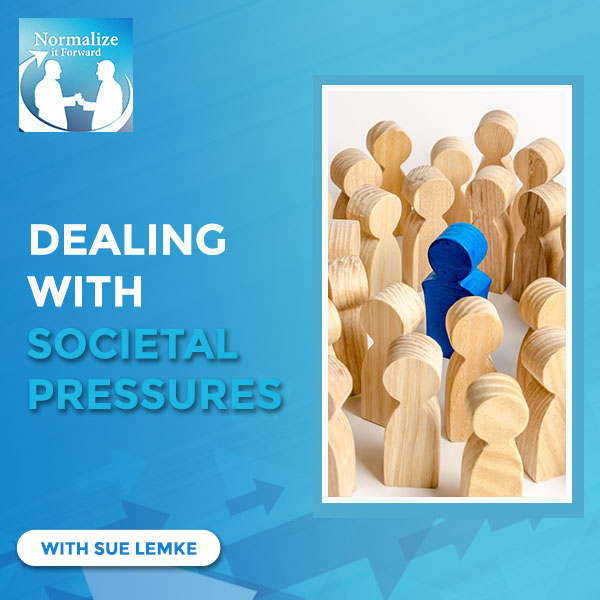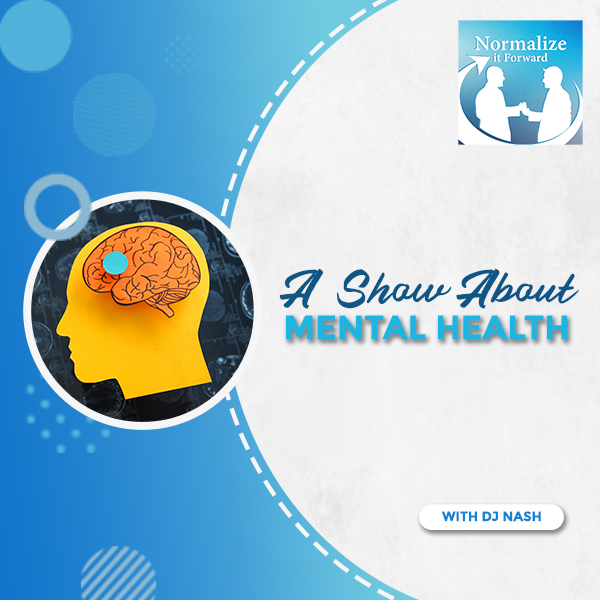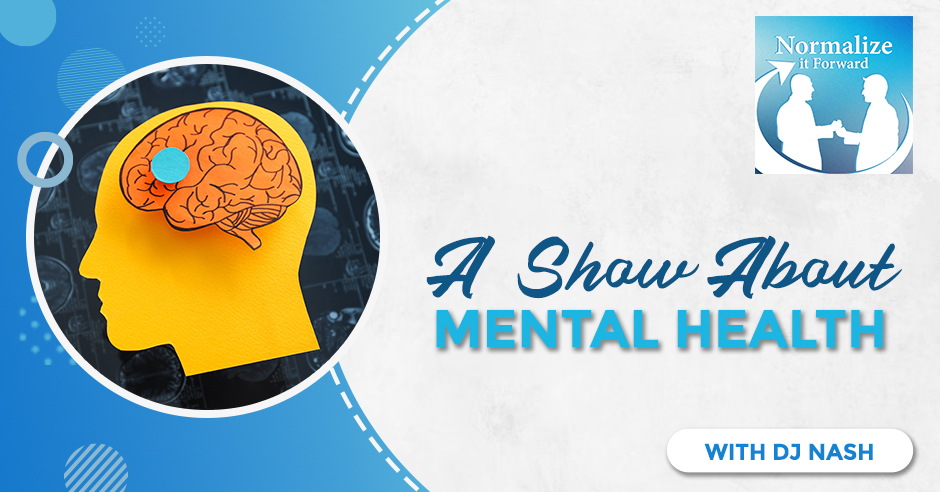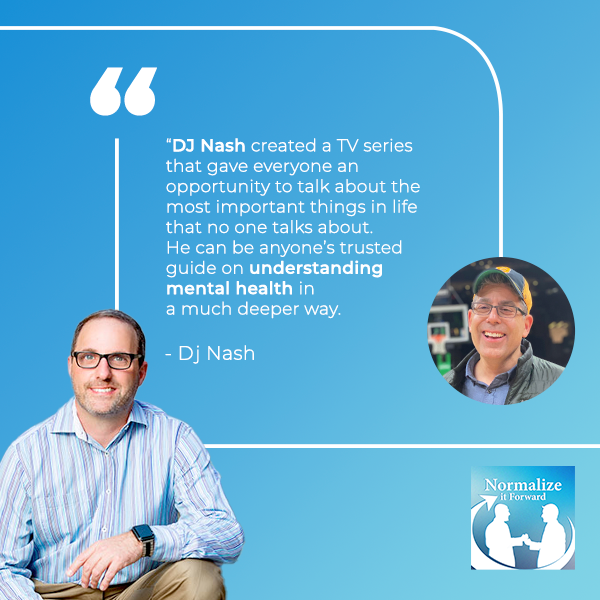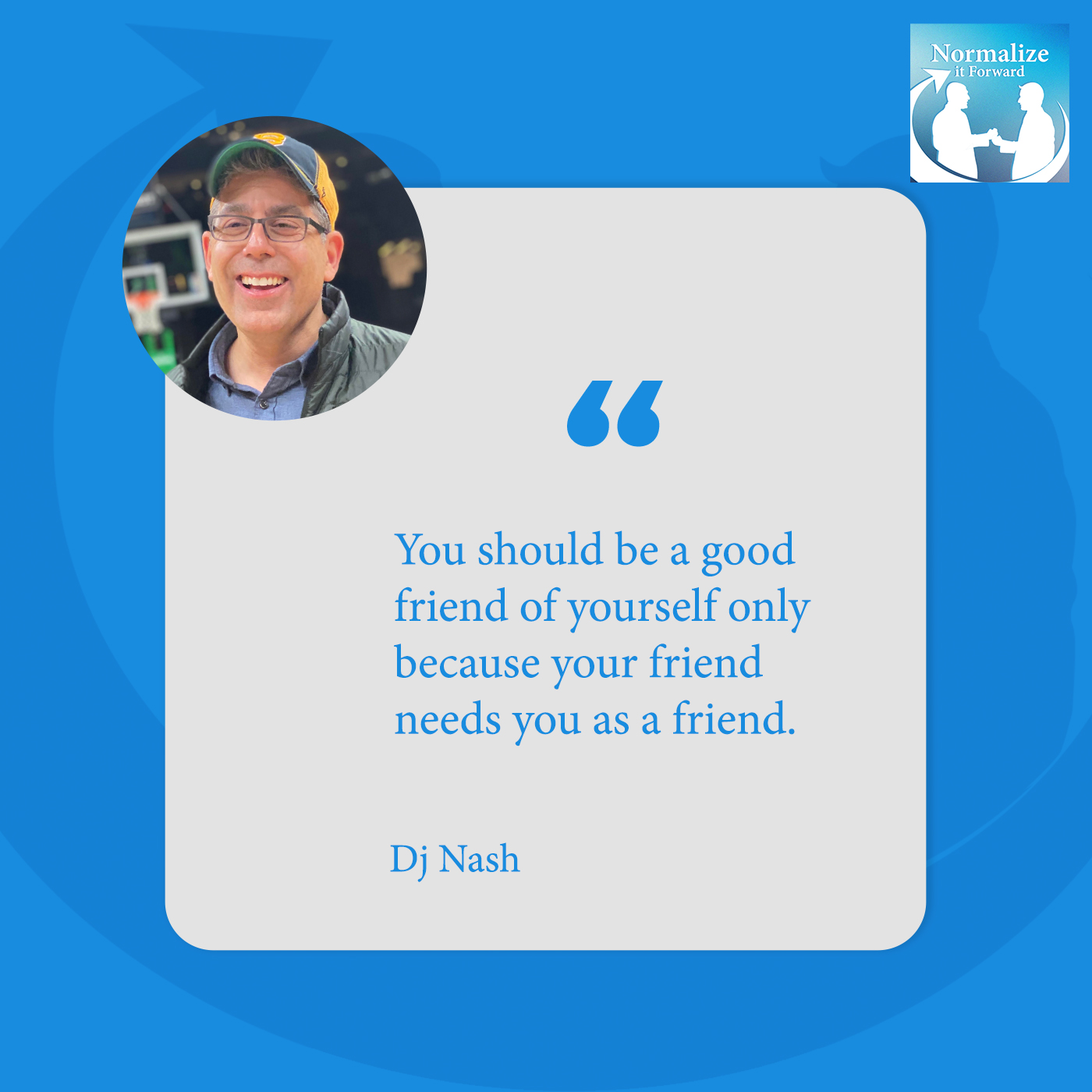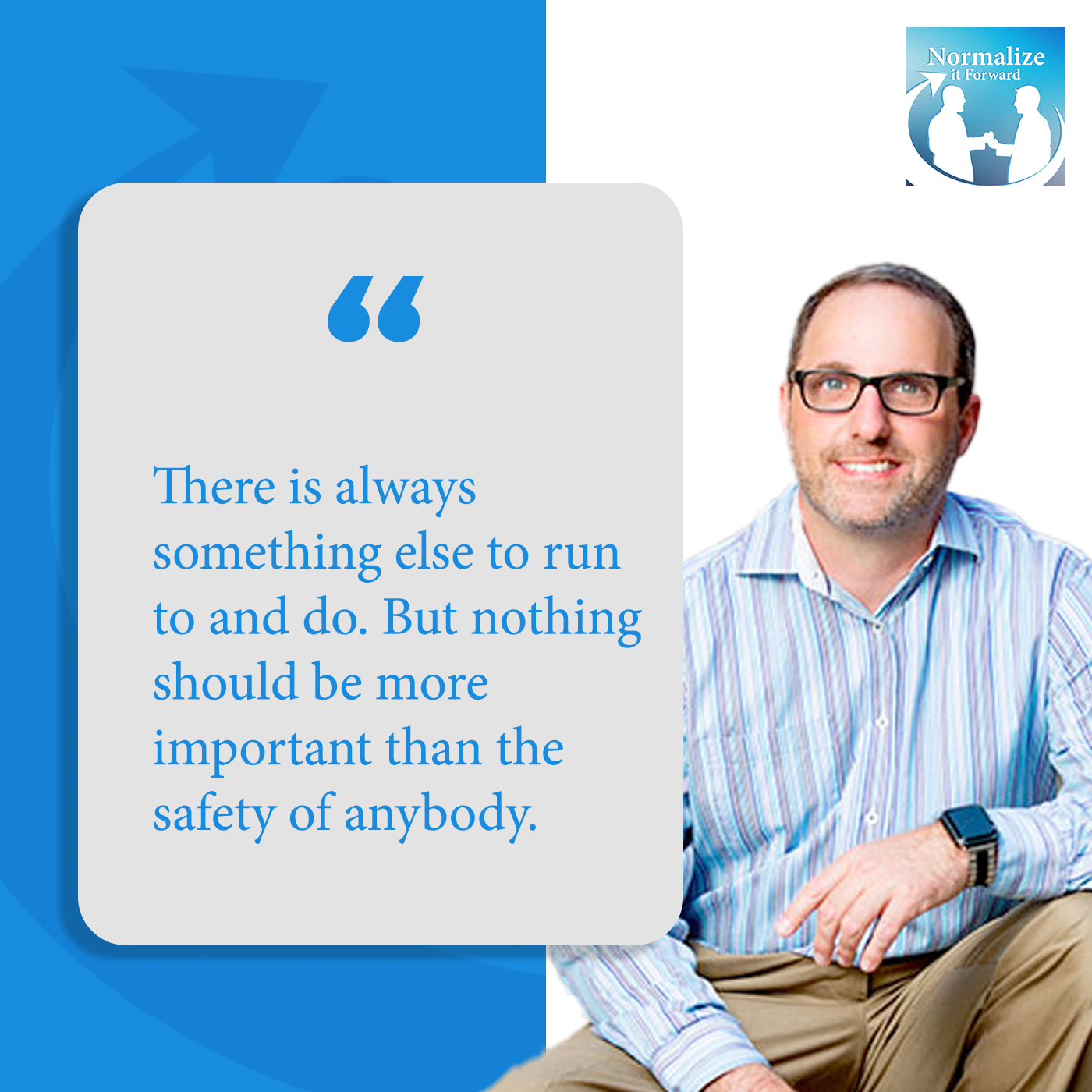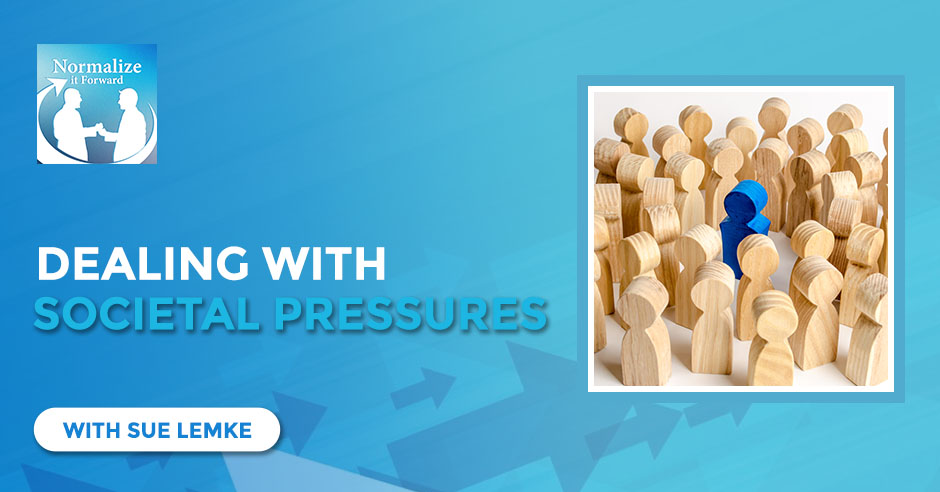
In today’s fast-paced world, young people often find themselves bombarded with a huge ton of societal pressures. When these become too much to handle, their mental health gets overwhelmed and pushed to the limit. Marc Lehman discusses how to address this alarming problem with educator Sue Lemke. Together, they explain how to help the youth get rid of the fear of missing out and reduce their obsession with their cellular phones – two of the leading causes of mental health issues. Sue also explores how the COVID-19 pandemic vastly changed the social skills of students today, which has led to higher risks of anxiety and depression.
—
Watch the episode here
Listen to the podcast here
Dealing With Societal Pressures With Sue Lemke
Introduction
Welcome everybody. We have on the show a super special guest, the show that openly talks about mental health and wellness and various topics that surround it. We are welcoming Sue Homrok Lemke. She’s an assistant superintendent of teaching and learning in Simsbury. She’s also a lecturer and adjunct professor of educational leadership at Central Connecticut State University working with aspiring administrators.
She began her career in special ed, becoming an adept practitioner in public schools while also developing models for alternative education. As a school administrator, she held various roles at both the building and district levels, including human resources and pupil services. Sue is passionate about ensuring all students succeed in their learning while experiencing connection and a sense of belonging. She resides in Connecticut with her spouse, Eric, and her two daughters, Maleita and Maeve. Sue, welcome.
Thank you. It’s great to be with you.
In addition to all that, she’s just a wonderful person who has helped many students including my own daughter over the years. I’m super excited to have you on the show and to tap into your wealth of knowledge, Sue. From really a variety of areas, I think that as an administrator nowadays, you’ve seen a lot, you’ve been around a lot, and I’m sure thousands of IUPs and PPT meetings, and seeing things from different angles. Part of what I really hope to talk to you about is just the trends of what we’re seeing academically with young people nowadays. We’ll get into it. I’m super pleased to have you here. Welcome.
Thanks for having me.
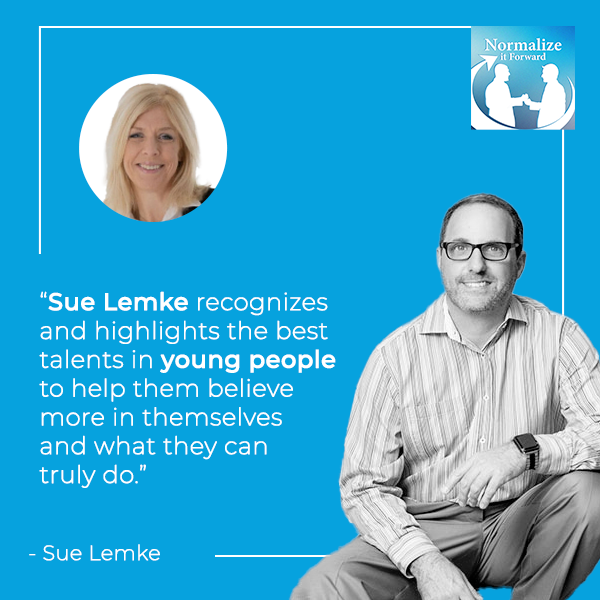
Working In Education
Of course, absolutely. Let’s start off. Sue, in education, you’ve been in the classroom and you’ve been out of the classroom. Can you give us a sense as to just give us capture your career a little bit in terms of where it once was and where it is now?
In my teaching capacity, I was a special education teacher. Although I had experiences at the elementary level, I found most of my teaching career at the secondary level, at both middle school and high school. When you have a background in comprehensive special ed, you have dabbling in many kinds of different topics and disabilities and how they play out in the classroom environment. I found myself honing in and specializing with students with emotional difficulties. They were just my jam.
Usually, there’s no one characteristic or a set of characteristics because they’re all individualized and unique. I found students at that point in my career, and this was 25 years ago, where students had incredible intelligence or often not in what we would call mainstream classrooms at that point in time because of their behavior, because of their manifestation of what was going on internally with them. Their difficulty with expressing themselves in a way that was socially acceptable in a public school setting. I found myself really getting excited and passionate about that population.
They are extremely funny and kept me on my toes. I believe with certain teaching into a certain skillset, they could absolutely be successful in a general education environment. There were some cases that just wasn’t appropriate at that point. I became very invested in alternative education. For students who weren’t demonstrating success in general education, a typical hour of the day public school environment. How do we think of school differently? How do we build knowledge and skills in our kids in a different way that was out of what traditional school looked like?
I was able to co-facilitate an alternative education program where the actual schooling happened late afternoon and early evening with supported work experiences during the day for students. Enabled them a smaller environment with very specific teach into certain skills in a way that they could be successful. That really became more of my specialty in that secondary environment. I had an incredible principal at the time. She said, “You really should be thinking about how to share your influence on an administrative level.”
Interesting or not, I was always pretty good at school. I could figure out the code and the games and what I should do and shouldn’t do and when I should do that and when I shouldn’t do that. I went back to school and received my administrative certification and left the district where I was at Northwestern Connecticut, and moved into a building-level administrative role. I was there for a couple of years and now have been in the same district for almost twenty years now. It’s exciting work for me.
What I love about education is that it’s never boring. It’s always a set of new challenges and problems to solve, but I think the most important part is that we do that in partnership. We do that in partnership, certainly with other educators, certainly with the students that we’re working with. Their parents, their families, outside practitioners like you Mark, and community members. It truly takes all of us pulling together in the same direction with good communication and understanding because we all want the same thing. No matter what seat we have, that’s what we want for our child. If we’re looking at it through a parent aspect, it’s our student as an educator, it’s a citizen. If it’s a community partner, we want them to be successful.
We have put cell phones in kids’ hands, which are far more complex than their brain development. Share on XI think that’s amazing. I can honestly say, I was just thinking about other people I’ve interviewed for the show. You’re unique in this way Sue and I’ve worked directly with you and I’ve seen your impact. One of the things that you just do so naturally and so organically is you get students to believe in themselves.
Societal Pressures
I think that so often we see young people that have been beaten down by the system and made to feel a certain way. When you treat somebody equally like they’re a human being and they’ve got some amazing talents, we all have talents and it’s just a matter of drawing them out, right? You’re so good at that. You really are really excellent at that. I’ve watched you do it. I know many kids over the years have benefited. I’m curious, just because you’re around kids all the time, and you probably have this happen.
I sometimes find myself using their lingo and I’m like, “What’s going on?” I’m like, “I’m around kids all the time too, that’s why.” We’ve seen these trends. We’ve seen these trends with things like depression and things like anxiety, where certainly on the high school level and definitely on the college level, they’re trending in the wrong directions. We’re seeing suicide rates go up. We’re seeing anxieties go up and lots and lots of kids are depressed. I guess I’m curious when you think about your opinion as to maybe why this has happened over the last, let’s say, 5 to 10 years, roughly, what comes to mind?
I think first and foremost, it’s the societal pressures that kids are facing. Certainly, when I speak with people from our generation and previously, it’s okay, we’ve always had pressures. They’ll make an argument that in many cases, things are easier for kids. I’m not so sure. I think that technology, I think that it’s a blessing and a curse at times. I think that we have tools that we put in kids’ hands, meaning their cell phones which are far more complex than the brain development of those holding those phones.
Students did not have access to the world because of the internet. Instead, the world now has access to them 24/7. Share on XI think that that adds pressure that when we were growing up, and even at my beginning years as an educator, students didn’t have access to the world, and the expectation the world would have access to them almost in a 24/7 format. I got to go home and shut down and focus and work on the task at hand without a notification beeping on my phone or without worrying about what this group of friends was doing and where they were, “I wasn’t there and I was missing out.”
Kids talk about this fear of missing out. It’s very real. We had the ability to be able to say, “No, that’s over there.” It’s really compartmentalized. I don’t know if kids have that level of flexibility and quite honestly, that piece that we did. That worry manifests and I believe increased anxiety and increased depression. I have seen that as an increase and certainly have a couple of other ideas there as well. Anxiety and fear are often coupled together and we get to this point sometimes where we’re worrying so much about things that we cannot control, that it starts taking over and it starts being intrusive in our day-to-day functioning. That I see is hugely different than I did when I started my career.
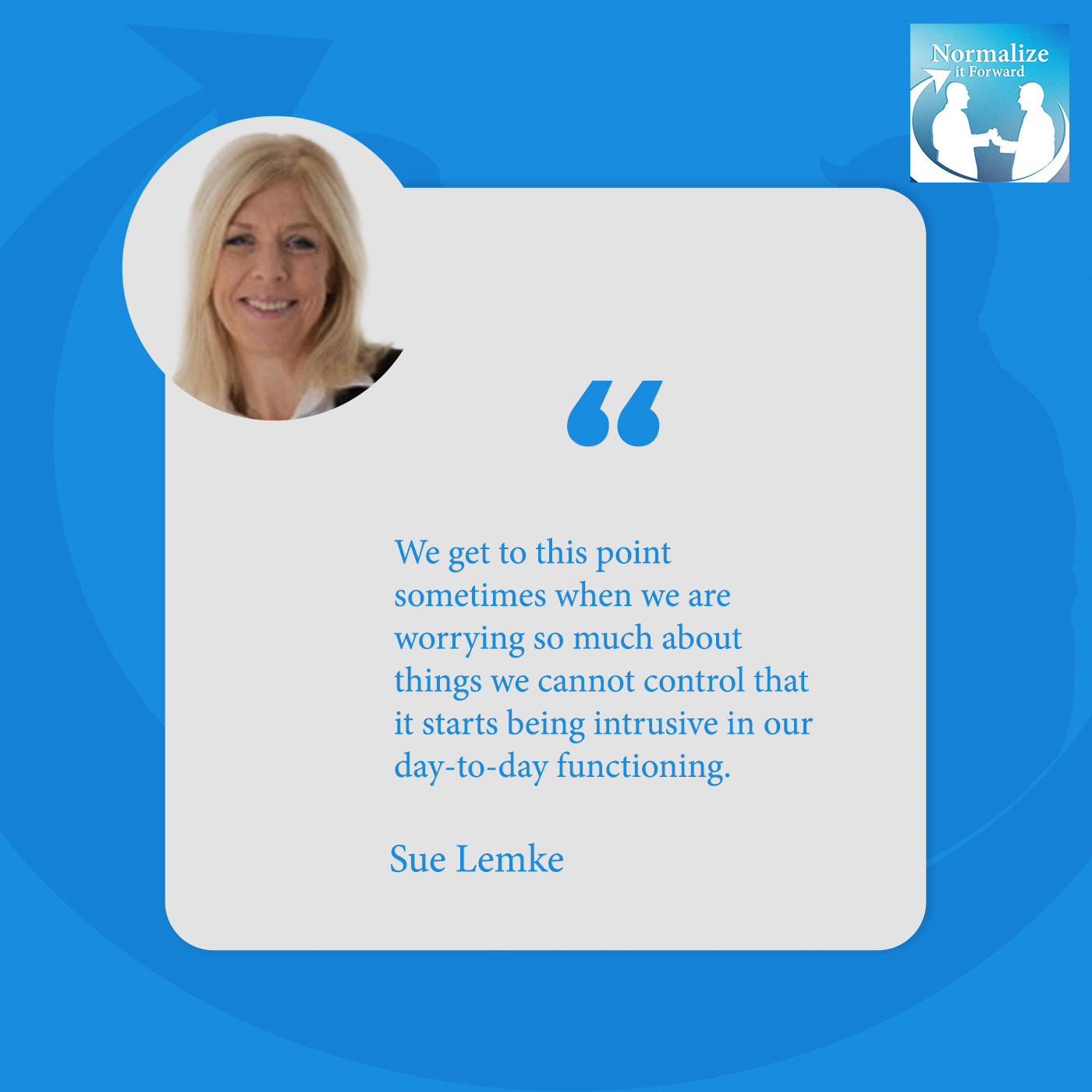
I totally agree. It’s funny, I’m smiling, because sometimes I’ll say to kids like if Sue were my friend in middle school and I wanted to get ahold of her, I’d use my rotary phone and I’d call her and I’d probably talk to her mom and Sue was busy. I’d leave a message and maybe Sue would get back to me the next day. When I tell kids nowadays this, they’re looking at me like I’m crazy. There was a piece that came with that we just expected. I’m not going to get in touch with Sue right away. By the way, if Sue’s busy, she’ll call me when she gets a chance.
Maybe when she gets a chance is like next week, like it’s not right away. You compare that to what kids have now. When kids shoot each other a text, if it’s been longer than 10 or 20 seconds, there are these assumptions that get made. As you said, I think there is a driver to stress and anxiety with regards to that. I see it all the time. We haven’t even touched on social media. We’ll get to that in a minute, but I think for kids there’s that constant pressure, the pressure of I’ve got to communicate. I’ve got to socialize. I’ve got to connect. I’ve got to do this. I’ve got to do that. They lose track of like, “No, you’re supposed to be doing your work or no, you’re supposed to be relaxing. No, you’re supposed to be having dinner with your family.”
I don’t have to be on all of the time. I think that there’s a perception that if I’m not hooked into my phone or that again, something is going on without me, or there’s a better experience that’s happening that I’m missing out on instead of prioritizing what’s right in front of me, which might be a meal or my family or rest or just a break.
Young people are hooked to their phones because of the fear of missing out of whatever is happening. They do not prioritize what is happening in front of them anymore. Share on XSchool Policies On Phones
That brings me to the next topic then. I want to ask your thoughts on this because we’re seeing these trends happening. I don’t know if they’re quite happening and seem very yet, but these trends of schools considering banning phones during the day and like these different ways they do it and different breaks they get. I know certain teachers will have the kids put their phones in cubbies and stuff like that. I guess I’m curious your thoughts on doing that and how you see that happening maybe even in Simsbury.
I think both at the middle school and high school this year, there’s been a reboot relative to cell phones and the policy. I have two girls, as Mark mentioned, as you mentioned, they’re 13 and 11, and they’re both at our middle school in Simsbury. They both have cell phones. That was the rule that they weren’t going to get them until they went to middle school. Certainly, we have very specific parameters at home about that.
They’re very well aware they don’t own the phone, Dad and I do. Therefore it’s subject to different filters and I can take that at any time and I can do spot checks and I will do spot checks and all of those things. When the recommitment to the cell phone policy, and I’ll just speak at the middle school for a second came out, which means as soon as you walk into that building, it’s in your locker locked in a way.
These very specific actions, not in a punitive way at first, but it’s this very stepped-out process of just what will happen if you choose to do that and have been very impressed with our administration for setting the context of the why, giving some data and information about yes. Cell phones can be valuable tools within certain contexts, but they can also be incredible distractors to the learning process.
Cell phones can be valuable tools within certain context, but they can also be incredible distractors to the learning process of students. Share on XWhat that data has looked like in research and how that’s playing out in the middle school. We were asked as parents to all go over this recommitment to the cell phone policy. We were asked as parents to sign saying that we understood as well as our kids and they had to sign too saying we understand and it’s for good reason and I have to say it’s going exceedingly well.
That’s fantastic.
Similar things at the high school they have to be off and away. There are conversations legislatively around putting some practices and mandated policies into play here. We want to make sure that we’re always responding in a way that’s appropriate for our community and in our schools, but that’s informed decision-making. It is hopefully in collaboration with our families as partners and setting up the imperative way that we don’t want to cause a further distraction to the learning environment.
We want to teach kids how to be present. We want to reinforce how we talk with each other and have dialogue without the distraction again, of worrying about what we’re missing out on. The only thing that we should be focused on here and now is this interaction with each other or this new content that I’m learning about and how to make that engaging.
I love it. I have to say too, I think beyond the academics, the other thing that I noticed with it, I’m on a private school campuses this year consulting and they’ve got very similar policies that no phones are allowed out, especially outside of the classroom on campus, is that kids are walking with their heads up and they’re looking at each other. I know that sounds so simple and so basic, but when I as a counselor sit with a 17 or 18-year-old kid going to college, and I’ve got a role play on how to dialogue and how to have a conversation, how to look people in the face.
The reason that’s happening is because kids have their head down all the time. I think an offshoot real positive that could come out of this is that kids start to socialize a little bit better. Kids start to look at each other in the face and have dialogue and say, “What’s up? What’s going on?” Instead of like giving you the grunt. They’re actually having conversations with each other, they’re having conversations with adults, which I think is so important to their overall wellness and well-being. It’s one of those things that you have to have.
Impact Of The Pandemic
Certainly, and I think there was another challenge in the educational world during COVID. We went to a platform that was predicated on technology and clicking in and being on a device to ensure that connection. That served an appropriate purpose at the appropriate time. Now we have to reteach some of that human interaction. You and I are on Zoom right now and making this dialogue happen, but how do you do that?
How do you do that in both? What does good interaction, and human interaction look like? How do I read cues? How do I read when something I’ve said has struck a chord positively or not so positively? How do I get that feedback and adjust one way or the other as a person? These are skills that sometimes we’ve assumed in the past. I always say it’s okay. You just haven’t been taught yet or that teaching hasn’t stuck yet. It’s our job to do that as educators.
I don’t mean to open a can of worms when I say this, but it’s like AI. Like there’s positive benefits to it. When it first came out, we branded it as evil, because kids were using it for not-so-good purposes, but it’s become one of those tools that isn’t going away and that can benefit kids in certain regards. I think that virtual is very similar. I was on a few weeks ago with a gentleman from a small island in Greece.
It was an amazing interview. I had so much fun. There’s no way I would have been able to interview this guy unless we had a brochure. I feel like there are benefits that we get and we just have to look at those human interaction things that you were talking about in terms of looking people in the face, in terms of reading body cues, in terms of having a conversation, you need to be able to do that in person. You need to be able to do that routinely because whether it’s friends, whether it’s staff members in school, whether it’s teachers, parents, girlfriends’ parents, or professors in college, it doesn’t matter.
Self-Care For Young Adults
You’re going to be around people forever. You need those skills. I’m thrilled to hear that I’m a big fan of managing cell phone use during the day. I think it’s good for kids. I think it gives them a break. It’ll be really interesting if there are some studies done over the next couple of years as to how that impacts things. We’ll see. I wanted to shift and just ask you about another topic that I think comes up a lot, self-care. Self-care is a phrase that’s thrown around a lot. I have my own definition, but I guess I’m wondering when you think about self-care for a young adult, what does it mean to you?
For me, it means how do I develop tools and systems and boundaries and structures so that when life gets hard because life will get hard. I’m ensuring that I’m taking care of some of my basic needs like sleep and eating and exercise. As well as some more developed skills and coping mechanisms to get through hard and to do hard differently or to do hard better, and to not always worry about stopping when something gets difficult because you’re not going to be able to do that realistically.
When that shows up, when that fear shows up or the heart shows up, I have skills to be able to navigate. That self-care, sometimes practicing those skills, sometimes making sure that I am living out those boundaries for myself and with others and actively practicing them and doing things that are fun and trying to give very specific time and space for balance.
I love that and I love what you said and I think it’s funny. I think back to when I was a teenager you had this thought process of life’s always going to be good. I like how you said that. You have life is a rollercoaster. You have your ups you have your downs. There are health things that pop up, there are financial things that pop up, and there are emotional things that pop up. I think self-care to me is one of those things that we can touch, we can actually tangibly choose to do.
That means if it’s midnight and you come across a great movie, do you sit there and watch it and you’re exhausted the next day or do you just go to sleep? I think we’ve all been there. We’ve all been in that spot. For me, it’s more usually the New York Yankee games. You got to figure out what’s best and what your body needs. I think that eating is the same way. I cannot begin to tell you how many young people I come across that’ll come to my office at 5:00 at night and they haven’t had a meal yet. They’re having their first meal at night. They haven’t had breakfast.
They skip school lunch because they don’t like it. It’s like, “Your body needs nutrients.” Sort of deciding for a young person, deciding and saying, “There are certain things in life we cannot change.” We can choose to get good rest. We can choose to eat decently and you don’t have to eat perfectly all the time, but I think as long as you’re getting your nutrients in, your brain needs that to be able to take it in. You and I think have a very similar view of exercise and just physical fitness. I think just for so many kids who come into my office who are inundated with stressors, inundated with anxieties, taking a walk in your neighborhood even can be so beneficial just to clear your head.
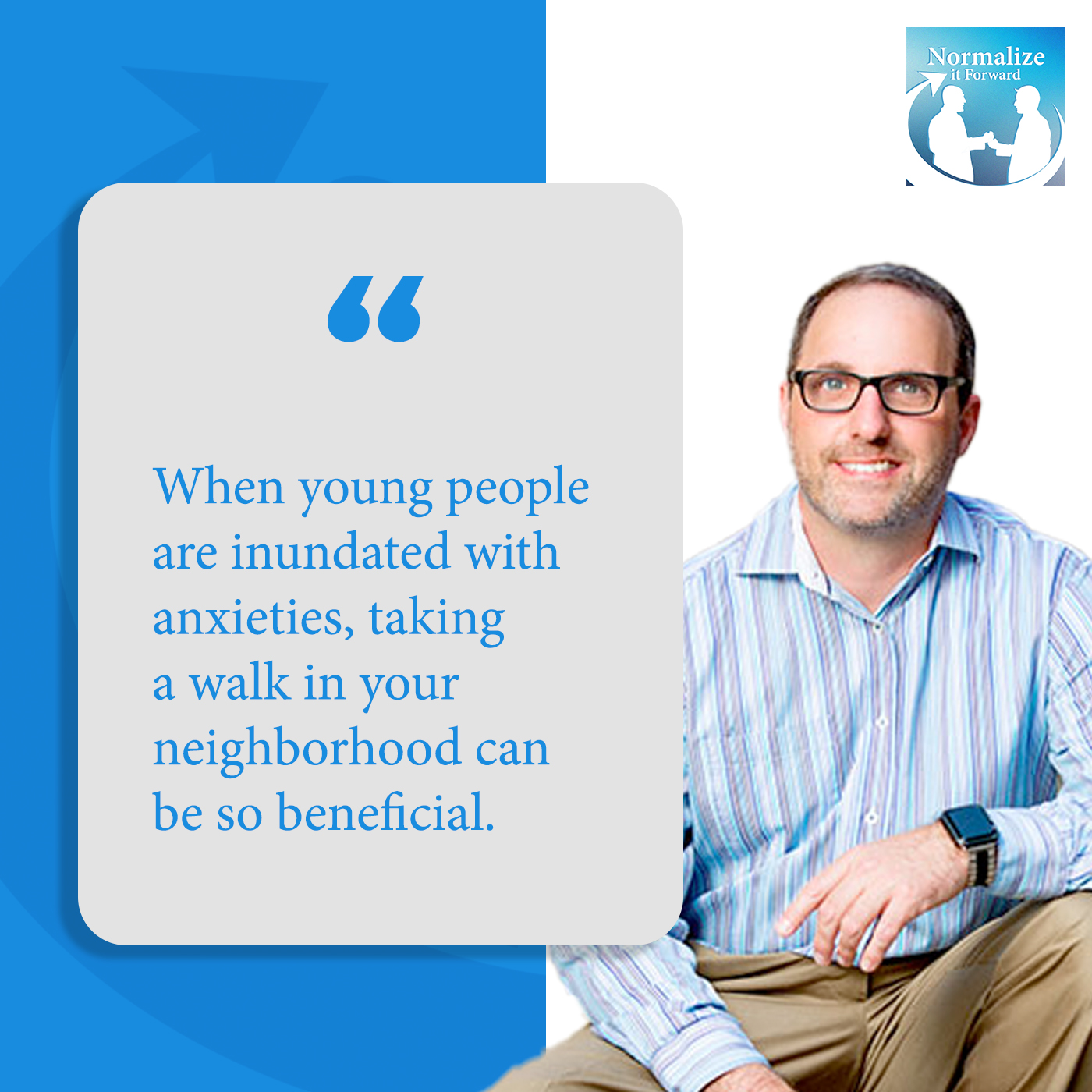
100%.
There are certain things that I think young adults and us older adults do, I should say, “Me.” You’re not older, right?
I am. It’s okay, I know you’re being gracious, but I am. I’m right there with you.
I think we’re just built the same and we need to relieve that stress. I think when someone puts their shoes on, puts their earbuds in, they go for that walk, they can tangibly touch that relief valve and just give themselves some of that opportunity to be a happier individual. I love how you said that. I think self-care is such an important topic for young people. Can I go back to COVID for a minute? You mentioned COVID.
Pre-COVID Vs. Post-COVID
COVID is such a big topic. I think obviously it impacted so many families in so many different ways. I’m thankful we’re now talking more openly about health and wellness. I feel like everywhere I look, there’s been a conversation about it. When you think about the students you have contact with regularly pre-COVID and the students you have contact with now post-COVID, what would you say is one of the bigger changes you’ve noticed?
That’s a really good question. I’m noticing more I think I’m noticing more pre, different during, and getting back to some of those pre’s again, a return to that. I’m seeing a skillset of students being able to have a better baseline, again, of how to have these social interactions that don’t seem so isolationist, quite honestly. I can enter into a collaborative situation and have some foundational skills. We’re seeing some of that as a gap. When I talk about education, sometimes I talk about the concept of windows and that there are developmental windows that we take advantage of and teach into as the brain literally is formulating.
We missed out on some of those windows in some places and spaces with COVID. Just the interaction component, the human interaction component during, it was prolonged for some people. Not in all cases, but students, for example, pre-COVID with issues around social anxiety. That’s hard being around people and negotiating these different environments really hard. During COVID, some of those students with that presentation, they were living their best selves, and they were feeling successful because I didn’t have to worry about the nuances of these different environments that I was stepping into as a teenager, as a school-aged kiddo.
Many students lived their best selves during the pandemic because they did not have to worry about the nuances of dealing with different environments. Share on XThis jam of being on a screen and dialing in and being isolated in many ways works very well for my disability because that’s easier for me than having to do this other. I would say that that was a big piece that I was very cognizant of. For these windows that may have shut a little bit, how do we prime back open and teach those skills that kids don’t have yet? I’m a big proponent on that word yet because I think it is a mindset. I think that we can always do better and be better for ourselves and for each other and get smarter about a lot of different things. I think that’s very much a malleable construct in my mind.
I think you’re right. I hadn’t thought of that, but that’s a really good point around social anxiety. I think for some of those kids, I mean, I’ve had a number of kids over the last couple of years say to me, COVID was my brightest moment. Like I loved COVID because it just worked for them and then to have to shift out of that. Some of the kids, as you know, just wouldn’t go back to school. They would school refuse. It does make sense. I mean, it was such a huge shift for so many, not only kids but families in general, for so many different reasons.
A Look At Stats
I’m curious about your thoughts on something. I look up stats from time to time and the stats on college campuses are oftentimes as few as 11% of kids that need help actually get it. The number is way lower than we’d want it to be. With some of the stats out there, as high as 70% to 80% of kids having mental health issues on campuses. When I look at those stats on the high school level, they’re a bit better, but not by much. I guess I’m curious in general, why would you say so many kids out there that need help? Don’t get it.
I think a couple of things. I think first and foremost, there is a fear of looking different. If I express that I need X, then I’m also making an assumption that my friends don’t, that other students don’t, and I look different. As students are trying to figure out who they are, that’s a really scary thought. I keep that in. We’ll take it through the lens of anxiety because we see a lot of anxiety. I have these internalized thoughts, these internalized fears, and instead of sharing them with a trusted adult, I hold on to them.
I actually think that what I’m experiencing is not normal. I don’t want to run the risk of putting myself out there and exposing my unnormal kinds of thoughts, feelings, and behaviors. That’s why I think that shows like these are so absolutely imperative and to get out and to normalize these conversations to say, “Listen, fears, worries, completely okay. That actually makes you human. Everybody has fears and worries.” When we have to maybe do something a little bit different, they start having strength that gets in the way of doing things that you love to do.
Whether that be being with your family or friends or playing sports or doing something that you really love doing. We just have to talk about what’s getting in the way. Sometimes kids think, “I have this fear, I have this fear of X.” I have to remove whatever is causing that fear. Let’s take dogs. I try to work around and never see a dog and never be in places where there are dogs instead of saying, “What am I going to do when I run into a dog? How do I develop the tools to pivot around and figure that out?” I do very much believe in some pedagogy of a woman named Lynn Lyons.
She is in what I believe is an expert in anxiety and she talks about anxiety being this insatiable beast and that when you try to remove what’s making you worry or anxious, anxiety will always replace it with something else. I remove the dog and then I’m fearing that something else. Instead of saying, “Anxiety is a really normal part of being a human.” What do you do when it shows up? What tools do you have to pivot around it and keep going?
How do you have a plan B? Sometimes the plan B doesn’t work and that’s okay. Like things will happen. I went a little bit out of a bird walk and I apologize for that, but why don’t students access help? I think that they’re worried about looking weird or strange or that they will be different or their fears or their feelings won’t be validated. They become the other. I’ll just hold onto them. This is just me. It’s not a big deal. I can handle it without having conversations to rely on again, trusted adults or in some cases, even an expert to say, “Let’s talk through this more.”
Students refuse to get help because they are worried about looking weird or fearing their feelings being invalidated. Share on XI think it’s an excellent point. I remember reading somewhere online where there was a conversation, back-forth conversation around anxiety and someone made the point of when did we decide that instead of tolerating things, we just eliminate them. If I don’t like to fly, then I guess I just don’t go anywhere. If I don’t like dogs, I guess I just don’t go to like ten of my friends houses versus learning how to tolerate it. A lot of times in my office, that’s the emphasis of we need to look at this as a very normal, natural part of life.
If we can learn how to tolerate it, think of the world we just opened up. I’m thinking about social anxiety because it’s so pervasive that so many kids have come out of COVID more socially anxious than ever. Again, some kids are just like, “If I just stay in my bedroom, forever?” Versus like, “Let’s figure out a way around this.” I think you make a great point. I really want my readers to read your point, which was excellent. That is, there’s help out there. There are ways to do this that don’t involve eliminating things in your world.
It doesn’t involve limiting things in your world. What’s interesting about the statistics going up is instead of kids looking at it as I’m weird or I’m different, they’re actually in the majority now. Kids that have anxiety, when you look at stats, many stats show that kids are way above 50%. They’re in that majority grouping now. I try to point that out to kids. It’s like you were referencing junior high before. It’s like being in junior high and going through puberty and pretending like nobody in the building is going through it. Everybody in the building is going through it. I try to say that to kids to say, “You don’t realize it, but in a room of like 25 kids, there are probably eighteen kids that are super anxious about things.”
Episode Wrap-up
Being able to let your guard down and realize that is important because that leads to kids actually getting some help and really being able to successfully master some of the tolerance surrounding you. Sue, you and I could talk all day long. I don’t want to go on and on because you’re such a super busy individual and I appreciate you making the time. I’m going to put you on the spot one more time though. Let me ask you this.
As far as normalizing it forward goes, the way I’ve conceptually set it up is I’ve asked people to nominate a friend, a coworker, or a relative if you have somebody in mind that you think would benefit my audience to be interviewed. I would love to get your thoughts on someone maybe that you’d like to nominate. What do you think?
You can put me on the spot and that’s okay. Quite honestly, the first person that comes to mind and it’s in more of a professional capacity is Justine Ginsberg from the Farmington Valley Health District. She has to this point, there is so much need out there relative to mental health that they’ve focused all of her time and effort on this topic. She really wants to work to partner with students and families and practitioners and community members and educators to do exactly what we’re doing which is to normalize these conversations, get resources in people’s hands and share it’s okay. There are ways, there’s helpers out there and she’s certainly one of them. That’s the person that comes to mind for me, Mark.
That’s awesome. We will get her on the show. She sounds amazing. Again, I appreciate your time, Sue. I can only say if your family’s out there and kids are out there and you’re lucky enough to engage with Sue and to benefit from all that you’ve done with people, you’re a lucky individual. Thank you so much for what you do. I just appreciate you making the time to be with us. Thank you.
I always appreciate you working with us and collaborating for kids. Thanks, Mark.
My pleasure. Have a wonderful evening. Thanks again, Sue.
Thank you.
Important Links
- Sue Homrok Lemke’s School Contact Information
- Sue Homrok Lemke’s Email
- Central Connecticut State University
- Justine Ginsberg
About Sue Lemke
 Sue Homrok-Lemke is the Assistant Superintendent of Teaching & Learning in Simsbury, CT. She is also a lecturer/adjunct of Educational Leadership at Central Connecticut State University, working with aspiring administrators.
Sue Homrok-Lemke is the Assistant Superintendent of Teaching & Learning in Simsbury, CT. She is also a lecturer/adjunct of Educational Leadership at Central Connecticut State University, working with aspiring administrators.
Sue began her career in special education, becoming an adept practitioner in public school, while also developing models for alternative education. As school administrator, she held various roles at both the building and district levels, including human resources and pupil services.
Sue is passionate about ensuring all students access rigorous learning, while experiencing connection and a sense of belonging. She resides in Connecticut with her spouse, Eric and their two daughters, Maleita and Maeve.

